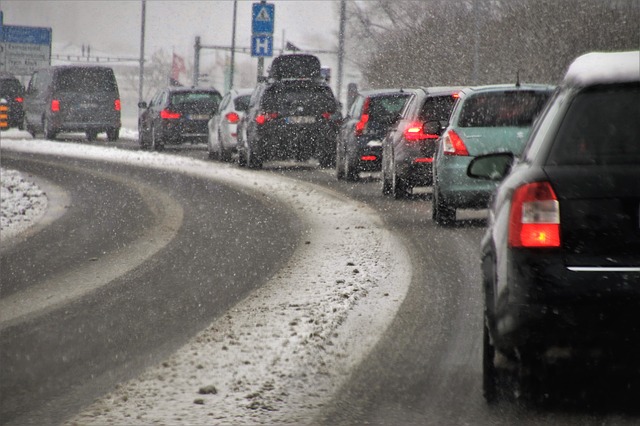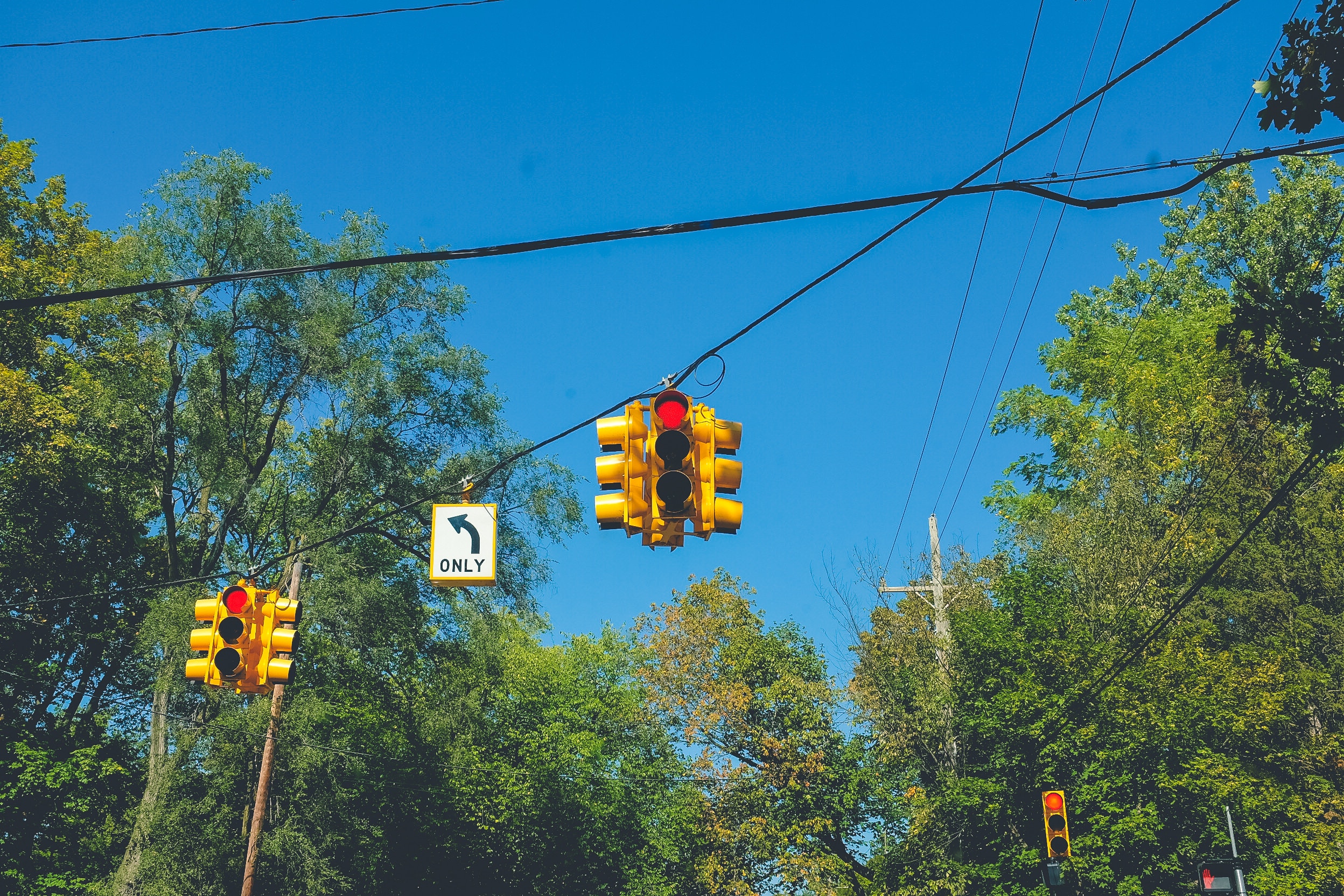Weather-Responsive Intersections Could Ease Traffic Congestion
Special Stories
15 Mar 2019 10:11 AM
[University of Waterloo] Cities could ease congestion and improve safety during snowstorms by tweaking the timing of traffic lights to take road conditions into account.
Researchers at the University of Waterloo collected data and ran computer simulations to determine that adjusting the signals at intersections in bad weather could reduce delays by up to 20 per cent.
“We need to have weather-responsive signal plans,” said Liping Fu, a civil and environmental engineering professor at Waterloo. “Their timing should recognize weather conditions and change accordingly.”
 Signals in modern cities are timed using optimization models that analyze factors including traffic volume and speed to safely get as many vehicles as possible through intersections.
“The problem is that those parameters all assume normal weather conditions,” said Fu, director of the Innovative Transportation System Solutions (iTSS) Lab. “In the winter, if the road surface is covered with snow and ice and visibility is poor, the numbers are not the same.”
Researchers analyzed hours of video taken at a busy intersection near campus to measure how motorists alter their driving during snowstorms in terms of speed, stopping distance and other variables.
Signals in modern cities are timed using optimization models that analyze factors including traffic volume and speed to safely get as many vehicles as possible through intersections.
“The problem is that those parameters all assume normal weather conditions,” said Fu, director of the Innovative Transportation System Solutions (iTSS) Lab. “In the winter, if the road surface is covered with snow and ice and visibility is poor, the numbers are not the same.”
Researchers analyzed hours of video taken at a busy intersection near campus to measure how motorists alter their driving during snowstorms in terms of speed, stopping distance and other variables.
 That data was then used in computer simulations to optimize the timing of signals - the green, yellow and red intervals, for instance - at a single intersection and on a stretch of road with four co-ordinated intersections.
Changes were also made to improve safety, such as increasing the yellow interval to account for vehicles travelling slower and requiring more time to stop.
At the single intersection, changes to increase safety and reduce delays almost cancelled each other out.
But even with adjustments to help avoid crashes, intersection delays in the co-ordinated corridor, especially in moderate traffic, decreased by up to 20 per cent.
That data was then used in computer simulations to optimize the timing of signals - the green, yellow and red intervals, for instance - at a single intersection and on a stretch of road with four co-ordinated intersections.
Changes were also made to improve safety, such as increasing the yellow interval to account for vehicles travelling slower and requiring more time to stop.
At the single intersection, changes to increase safety and reduce delays almost cancelled each other out.
But even with adjustments to help avoid crashes, intersection delays in the co-ordinated corridor, especially in moderate traffic, decreased by up to 20 per cent.
 [Photo by NeONBRAND on Unsplash]
Fu said cities with computerized signal systems are already equipped to remotely and inexpensively adjust the timing of traffic lights to reap those benefits when snowstorms hit.
Next steps include the development of technology using video cameras and artificial intelligence (AI) software to automatically tweak the timing of lights in response to traffic changes caused by weather, accidents or construction.
“Ultimately we want signal controls so smart that they actually change themselves in real time based on what is happening in the road network for any reason,” Fu said. The paper, Effects of winter weather on traffic operations and optimization of signalized intersections, appears in the Journal of Traffic and Transportation Engineering.
Edited for WeatherNation by Meteorologist Mace Michaels
[Photo by NeONBRAND on Unsplash]
Fu said cities with computerized signal systems are already equipped to remotely and inexpensively adjust the timing of traffic lights to reap those benefits when snowstorms hit.
Next steps include the development of technology using video cameras and artificial intelligence (AI) software to automatically tweak the timing of lights in response to traffic changes caused by weather, accidents or construction.
“Ultimately we want signal controls so smart that they actually change themselves in real time based on what is happening in the road network for any reason,” Fu said. The paper, Effects of winter weather on traffic operations and optimization of signalized intersections, appears in the Journal of Traffic and Transportation Engineering.
Edited for WeatherNation by Meteorologist Mace Michaels
 Signals in modern cities are timed using optimization models that analyze factors including traffic volume and speed to safely get as many vehicles as possible through intersections.
“The problem is that those parameters all assume normal weather conditions,” said Fu, director of the Innovative Transportation System Solutions (iTSS) Lab. “In the winter, if the road surface is covered with snow and ice and visibility is poor, the numbers are not the same.”
Researchers analyzed hours of video taken at a busy intersection near campus to measure how motorists alter their driving during snowstorms in terms of speed, stopping distance and other variables.
Signals in modern cities are timed using optimization models that analyze factors including traffic volume and speed to safely get as many vehicles as possible through intersections.
“The problem is that those parameters all assume normal weather conditions,” said Fu, director of the Innovative Transportation System Solutions (iTSS) Lab. “In the winter, if the road surface is covered with snow and ice and visibility is poor, the numbers are not the same.”
Researchers analyzed hours of video taken at a busy intersection near campus to measure how motorists alter their driving during snowstorms in terms of speed, stopping distance and other variables.
 That data was then used in computer simulations to optimize the timing of signals - the green, yellow and red intervals, for instance - at a single intersection and on a stretch of road with four co-ordinated intersections.
Changes were also made to improve safety, such as increasing the yellow interval to account for vehicles travelling slower and requiring more time to stop.
At the single intersection, changes to increase safety and reduce delays almost cancelled each other out.
But even with adjustments to help avoid crashes, intersection delays in the co-ordinated corridor, especially in moderate traffic, decreased by up to 20 per cent.
That data was then used in computer simulations to optimize the timing of signals - the green, yellow and red intervals, for instance - at a single intersection and on a stretch of road with four co-ordinated intersections.
Changes were also made to improve safety, such as increasing the yellow interval to account for vehicles travelling slower and requiring more time to stop.
At the single intersection, changes to increase safety and reduce delays almost cancelled each other out.
But even with adjustments to help avoid crashes, intersection delays in the co-ordinated corridor, especially in moderate traffic, decreased by up to 20 per cent.
 [Photo by NeONBRAND on Unsplash]
Fu said cities with computerized signal systems are already equipped to remotely and inexpensively adjust the timing of traffic lights to reap those benefits when snowstorms hit.
Next steps include the development of technology using video cameras and artificial intelligence (AI) software to automatically tweak the timing of lights in response to traffic changes caused by weather, accidents or construction.
“Ultimately we want signal controls so smart that they actually change themselves in real time based on what is happening in the road network for any reason,” Fu said. The paper, Effects of winter weather on traffic operations and optimization of signalized intersections, appears in the Journal of Traffic and Transportation Engineering.
Edited for WeatherNation by Meteorologist Mace Michaels
[Photo by NeONBRAND on Unsplash]
Fu said cities with computerized signal systems are already equipped to remotely and inexpensively adjust the timing of traffic lights to reap those benefits when snowstorms hit.
Next steps include the development of technology using video cameras and artificial intelligence (AI) software to automatically tweak the timing of lights in response to traffic changes caused by weather, accidents or construction.
“Ultimately we want signal controls so smart that they actually change themselves in real time based on what is happening in the road network for any reason,” Fu said. The paper, Effects of winter weather on traffic operations and optimization of signalized intersections, appears in the Journal of Traffic and Transportation Engineering.
Edited for WeatherNation by Meteorologist Mace MichaelsAll Weather News
More